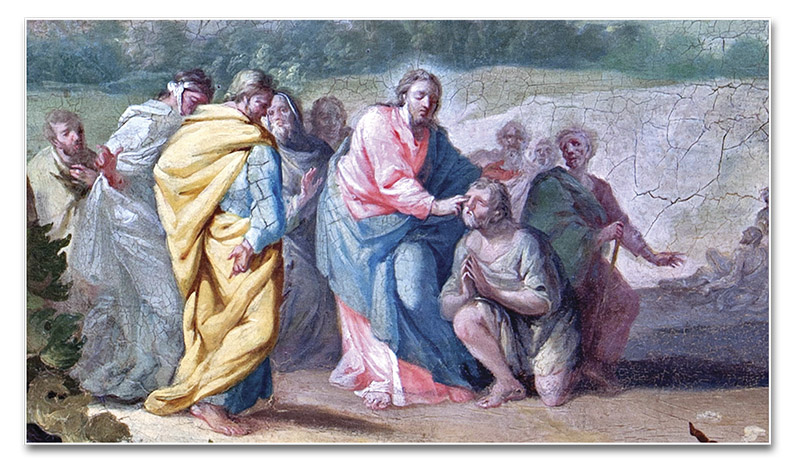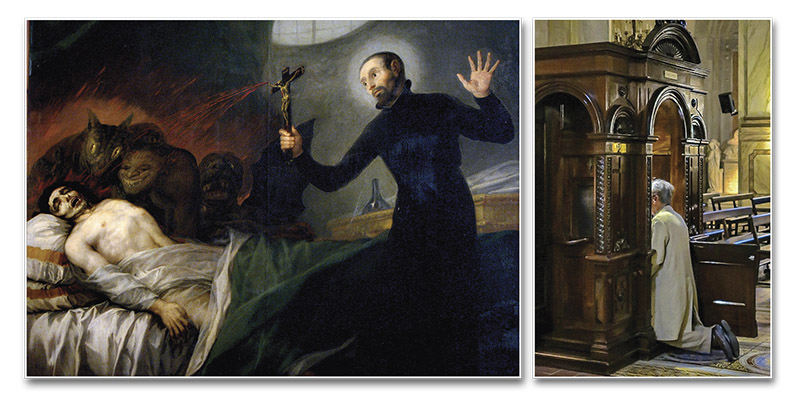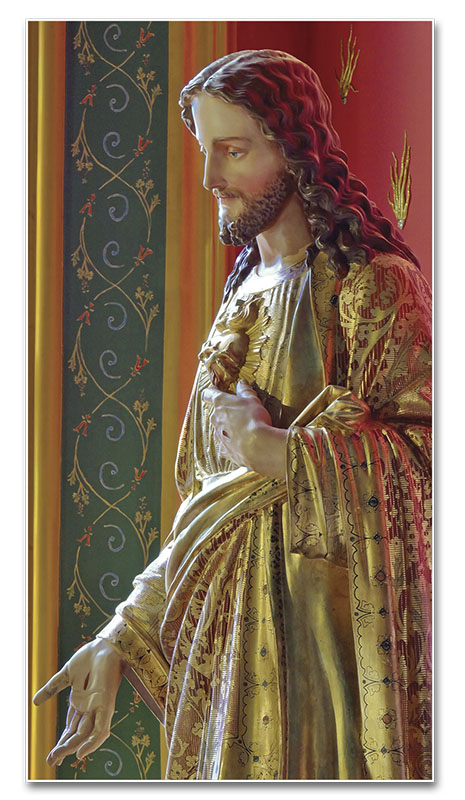Even more than fearing the misfortune of physical deafness, we should be on guard against the contagion of insensibility to God’s voice from which present-day humanity suffers.
Gospel for the Twenty-Third Sunday in Ordinary Time
31 Again Jesus left the district of Tyre and went by way of Sidon to the Sea of Galilee, into the district of the Decapolis. 32 And people brought to Him a deaf man who had a speech impediment and begged Him to lay His hand on him. 33 He took him off by himself away from the crowd. He put His finger into the man’s ears and, spitting, touched His tongue; 34 then He looked up to Heaven and groaned, and said to him, “Ephphatha!” – that is, “Be opened!” – 35 And immediately the man’s ears were opened, his speech impediment was removed, and he spoke plainly. 36 He ordered them not to tell anyone. But the more He ordered them not to, the more they proclaimed it. 37 They were exceedingly astonished and they said, “He has done all things well. He makes the deaf hear and the mute speak” (Mk 7:31-37).
I – The Marvels Promised by God
The Liturgy for the twenty-third Sunday in Ordinary Time makes various references to deafness and dumbness. However, its teaching far transcends the physical aspect of these bodily deficiencies, opening our eyes to an incomparably greater evil.
In the first reading, from the lips of the prophet Isaiah, God promises salvation and announces true marvels for the future: “Here is your God, He comes with vindication; with divine recompense He comes to save you. Then will the eyes of the blind be opened, the ears of the deaf be cleared; then will the lame leap like a stag, then the tongue of the mute will sing. Streams will burst forth in the desert, and rivers in the steppe. The burning sands will become pools, and the thirsty ground, springs of water” (35:4-7a).
Without doubt, this prophecy was fulfilled in Our Lord Jesus Christ, but it does not refer merely to the physical prodigies accomplished by the God-Man. When He cured, He often made affirmations such as: “Go your way; your faith has made you well” (Mk 10:52), “go, and do not sin again” (Jn 8:11), and many others, by which He emphasized the link between corporeal infirmity and its spiritual equivalent. Therefore, every cure, beyond its real and concrete aspect, is symbolic of the greatest miracles worked by Our Lord: the spiritual ones which are more complex than the physical.
Spiritual miracles surpass physical ones
For example, with regard to the Sacrament of Penance instituted by the Divine Saviour, sound Theology explains that the absolution given to a person in a state of mortal sin is a miracle infinitely greater than if all of humanity had its arms cut off and someone performed the prodigy of restoring them one by one. In the confessional, divine life cast out by sin returns to reanimate the soul, and this by far surpasses any portent of a corporal nature.
Analogously, in a catechism class nowadays, a child hears, with all naturalness, marvels of which the prophets, kings and patriarchs of the Old Testament had no notion. Before the Revelation brought by Our Lord Jesus Christ, they heard prophecies such as that of Isaiah, but failed to understand them, for they were deaf to these truths, blind to seeing such lofty realities clearly, and paralysed – unable to perform the works meritorious in God’s eyes that became commonplace after the Redemption.
Such was the new influx of divine life that penetrated humanity; the change that commenced with the Incarnation of the Word is unimaginable!
Thus, in all of His miracles, Our Lord sought to establish the idea that He brought an altogether exceptional salvation, which far surpassed the expectation held among the Chosen People of the coming of a liberator who would free them from military attacks or the payment of taxes; it even surpassed the Messianic promises of restitution of sight to the blind, speech to the mute and hearing to the deaf. In other words, there would be such an infusion of graces, such a superabundant Redemption, that the stimulus for the practice of good would become very strong and the wrath of satan against humanity would be avenged. Finally, Jesus would come to open the gates of Heaven so that men would participate in His life and happiness, avoiding the path to hell!
It is in view of these supernatural horizons that we should consider the beautiful miracle narrated in this Sunday’s Gospel.

II – A Cure Preceded by Signs
Our Lord was still in pagan lands, where a short time previously He had cured the daughter of the Canaanite woman (cf. Mk 7:24-30). He was crossing the district of Decapolis, a region where He was already well known, for there the former possessed man had preached in His regard (cf. Mk 5:1-20), preparing the field for the proclamation of the Good News.
The benefit of a request for intercession
31 Again Jesus left the district of Tyre and went by way of Sidon to the Sea of Galilee, into the district of the Decapolis. 32 And people brought to Him a deaf man who had a speech impediment and begged Him to lay His hand on him.
Since a deaf person does not hear his own voice, he has difficulty in finding the right balance in tone and volume while speaking. While he may manage to utter some words, he generally still needs someone to act as an intermediary to interpret the sounds emitted. It seems that this is the situation laid out the Gospel. In using the verb “brought”, St. Mark shows that it was not that man who asked to go to Our Lord, but others, who heard and spoke normally, who brought him, undoubtedly drawn by His reputation as a great wonderworker.
Why did he not go to Jesus on his own? This man, living in one of the ten small cities of Decapolis, lacked the means to fully understand who Our Lord was, owing to his deafness. Furthermore, as an inhabitant of that district, he was likely still a pagan and, therefore, did not have faith. The readiness to come before the Divine Master and believe in Him was not his, but that of others.
Nevertheless, Our Lord was happy to note this intervention of his friends. As supreme intermediary between God and men, it pleases Him to employ the impetratory power of intercession, which is much greater in His sight than we can imagine! It was not by chance that, in teaching the perfect prayer, He prayed it in the plural. The Our Father is a collective request, in which some intercede for others, for He wants this mutual love, in which everyone cares about the other.
These people ask Our Lord to lay His hands upon their companion, this being the common gesture, at that time, for priests to implore a cure for the sick. However, Jesus does not use the habitual method.
Numerous signs to highlight the author of a prodigy
33 He took him off by himself away from the crowd. He put His finger into the man’s ears and, spitting, touched His tongue; 34 then He looked up to Heaven and groaned, and said to him, “Ephphatha!” – that is, “Be opened!”
Perhaps fearing that some onlookers of a Pharisaic mentality would not understand His conduct, Our Lord took the deaf man “away from the crowd” that pressed around Him. In fact, the method the Divine Master used to work the cure is unusual.
It awakens surprise, because, at first sight, it seems to contravene current concepts of hygiene and good manners. However, we must not be like Pharisees, judging God to be subject to the same norms as those begotten in original sin. Among creatures thus conceived, it would be objectionable to use saliva, but not when it comes from the mouth of the Word Incarnate… What a privilege for that poor man! It is not said where nor how He spat, but we cannot doubt his infinite refinement in doing so, before wetting His finger so as to touch the deaf man’s tongue.

In reality, one word from Our Lord would have been sufficient to resolve everything. He could have even cured him from a distance, as in the episode of the servant of the Roman centurion (cf. Mt 8:5-13). However, He wished to make it clear to that simple soul of little faith that it was He who cured him. Thus, He made a point of emphasizing the miracle with all of these gestures. If He had only imposed His hands, the deaf man have had the sensation that a spirit had worked the prodigy. But no, only Jesus Christ has power to transcend the laws of nature, for He is God.
Nevertheless, it is intriguing that up until then nothing had happened… Our Lord wished to further show Himself as our supreme intercessor before the Eternal Father and, therefore, He raised His eyes to Heaven, as if asking for power, and then ordered by His own authority: “Be opened!”
In this way, He revealed His two natures: human and divine. As Man, He performed those gestures and looked to Heaven, so that the deaf man would understand that He prayed to the Father. Then He cured by His own authority, as only God can do.
To glorify God it is necessary to remove oneself from the centre
35 And immediately the man’s ears were opened, his speech impediment was removed, and he spoke plainly. 36 He ordered them not to tell anyone. But the more He ordered them not to, the more they proclaimed it. 37 They were exceedingly astonished and they said, “He has done all things well. He makes the deaf hear and the mute speak.”
As the ears of the deaf man were opened, his speech impediment also disappeared. And he must have immediately made abundant use of his speech with everyone around him, especially those faith-filled companions who had brought him, with unsurpassed charity, to the feet of the Divine Wonderworker.
The impression caused by the prodigy left them ecstatic with happiness and Our Lord, as on so many other occasions, recommended that, for reasons of prudence, they avoid speaking about the occurrence. However, from all eternity He knew perfectly well that they would not obey Him… Why did He then insist on this point, if Incarnate Wisdom can do nothing that does not serve some purpose?
He thus registered for history that when something of God is done, it is God who should be put in the centre, and not the one who merely served as an instrument. The God-Man Himself having given us this example, we should never use the action of grace to call attention to ourselves.
III – Deafness: Symbol of a Humanity Closed to God’s Voice
As we considered at the outset of this commentary, the Gospel of this Twenty-third Sunday in Ordinary Time offers profound spiritual meaning, which far surpasses the edifying miracle worked by Our Lord with the aim of setting human sights on the Kingdom of God.
The Church Fathers agree in interpreting the physical deafness of this man from Decapolis as a symbol of what occurs with those who do not have faith, just as, historically, was perhaps the situation of the poor deaf man. Lack of faith makes the soul torpid and incapable of understanding the word that comes from God, in the same way that an animal is not given to understand what the human intelligence grasps. This deafness to divine things dramatically comes to the fore when attempting to speak of matters related to the supernatural world among un-baptized people who are closed to the action of grace.

Muteness, in turn, represents the neglect to glorify God and speak to others of Him. Not having God on one’s lips means being mute regarding the supernatural life. For what good is it to speak of any aspect of creation without raising one’s thoughts to the Creator?
For good reason, Our Lord complained of His interlocutors: “This people honours Me with their lips, but their heart is far from Me” (Mk 7:6). And He often exhorted: “He who has ears to hear, let him hear” (Mk 4:9). It is clear that He was not referring to physical hearing, but rather listening to God.
God makes Himself heard in the most varied ways
In fact, the spiritual life consists in listening to this mysterious voice, for the Lord constantly communicates with us. But His appeal requires a response. If it is impolite to fail to return the greeting of a senior, how much more so to treat God in this way. Let us follow the example of Samuel in being called during his sleep: he stood up and said “Præsto sum! – Here I am!” (1 Sm 3:4). Or that of St. Paul when he heard the question of Our Lord: “Saul, Saul, why do you persecute Me?” (Acts 9:4). From the Pharisee persecutor of Christians, he became the Apostle par excellence in readily responding: “Lord, what wilt Thou have me to do?” (Acts 9:6).
God never abandons the rational creature. On the contrary, He has a true desire to communicate with each one. How?
First, through creation, for everything in existence speaks to us, in some way, of God. Even contemplating a little ant toiling to carry a leaf much larger than itself shows us how He cares for the beings that He created, and how generous He was in giving each one the necessary qualities for their development. Providence can manifest Himself even when a disaster befalls a person who is following the wrong path… For it is said: “The Lord reproves him whom He loves” (Prv 3:12).
At other times, we feel the presence of God while reading a passage of Sacred Scripture, pondering the episodes of the life of a great Saint, or yet again in contact with the voice of the Church, which comes to us through a good sermon, the example of a virtuous religious, or the recollected ambience of a sacred precinct. These are situations in which the Lord speaks to us by external means.
But He can also do so interiorly in many circumstances, whether by the prick of conscience that even touches the most hardened sinner, warning him that he is on the wrong path, or by means of a trial that brings benefits to the soul, or though a myriad of other movements of grace.
God is constantly speaking with everyone, even with sinners, calling us ad maiora!

The deafened world
But if God communicates to us with such verve and by so many ways, why is deafness to His voice so universal? We could say that the world has become deaf and tongue-tied! Today no one speaks of God, of the striving for sanctity, the hatred that we should have for sin or the great risk that modern man runs of being thrown eternally into hell. In general, people’s lives revolve around personal concerns, forgetful of the Creator and supernatural realities. Those who do not externalize their love for the Lord through prayer and an intimate relationship with Him, become deaf.
The main cause of this evil is in opening the ears to strange voices that do not lead to God, obstructing the auditory canal with filth. How is it possible to listen to the divine voice while tuning into the clamour of the television, the internet and so many other things? Ears filled with a hankering for the things of this world cannot distinguish the voice of the Almighty, for it is impossible to pay attention to two conversations simultaneously. Either one speaks with God, or with satan!
Therefore, vigilance! The world’s language uses all of its charms on us, while the voice of God is gentle and very pleasing, but austere and temperate.
Spiritual audition depends on faith
From this outlook, spiritual audition can improve or deteriorate, depending on the circumstances to which we expose our faith. Entirely natural acts, devoid of transcendent significance diminish faith; increased application to the supernatural aspects of creation admits us further into the ample, profound and rich panorama of the faith.
Just as a muscle, consisting of fibres susceptible to growth and diminishment, becomes flaccid when immobilized in a cast, our faith also begins to wane when encased in the plaster of intense egoism. To exercise faith, we must break this plaster, come out of ourselves and turn toward the supernatural.
This is why hardened sinners, barbarized by the din of their unbridled passions and desirous of sinful sensations, cannot hear God’s voice or, if they in some way hear it, they do not respond.
The remedy for deafness
If we sense our own deafness in face of this grave scenario, we ought to ask ourselves: what is the solution? This Sunday’s Gospel also supplies the reply.

First, we must approach Our Lord, even if lead by others. Then, we must let ourselves be taken aside, in other words, away from the agitation of the world, away from the attractions of the disordered senses, away from the enticing promises of the devil which amount to nothing but lies. Then Our Lord can place His finger in our ears and resolve everything.
With our hearing restored, we will finally be able to speak with ease. And just as the deaf man had his tongue touched by the finger and by the saliva of Our Lord, His divine power will rest upon us, instilling the wisdom that will lead us to know all things from their highest causes. Finally, it is of no use to open our ears and loosen our tongues to say what is inappropriate. Our Lord touches us and gives to our tongue the nature of His word so that we speak only of the marvels of salvation, following the example of those who contemplated the miracle narrated in the Gospel: “He has done all things well. He makes the deaf hear and the mute speak.”
The Author of these lines recalls a person who never neglected any opportunity to use the gift of the word to uplift others to God: his father and spiritual master, Dr. Plinio Corrêa de Oliveira. Even if someone engaged him in small talk, before long and with graceful ease, he would ascend to sublime considerations. In fact, one day, the writer of these lines spoke lightly with him in a filial tone: “You are dangerous. Normally, when something is released it falls to the ground because of the law of gravity, but you, when you are released, you immediately ascend to the heights!”
Let us ask Our Lady to obtain for us the grace of acting likewise: constantly desiring to ascend to God! Keeping in mind the promise “In the end, my Immaculate Heart will triumph!”, we know that her intercession will bring an era in which humanity will hear God like never before, for there will be a new breath of the Holy Spirit in history, by which all things will assume a new look and new vigour. May She always make us hear the voice that comes from on High and speak tirelessly of the marvels of her Divine Son! ◊







